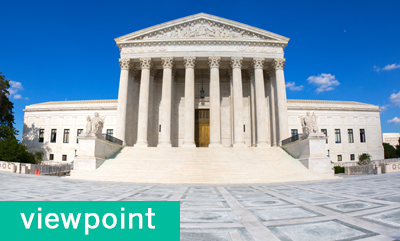SCOTUScare for Obamacare.
 Viewpoint articles are written by members of the SPH community from a wide diversity of perspectives. The views expressed are solely those of the author and are not intended to represent the views of Boston University or the School of Public Health. We aspire to a culture where all can express views in a context of civility and respect. Our guidance on the values that guide our commitment can be found at Revisiting the Principles of Free and Inclusive Academic Speech.
Viewpoint articles are written by members of the SPH community from a wide diversity of perspectives. The views expressed are solely those of the author and are not intended to represent the views of Boston University or the School of Public Health. We aspire to a culture where all can express views in a context of civility and respect. Our guidance on the values that guide our commitment can be found at Revisiting the Principles of Free and Inclusive Academic Speech.
A sigh of relief came from the White House and at least 6.4 million households Thursday morning when the US Supreme Court upheld federal tax credits for people who buy health insurance through the federal health insurance exchange. As President Obama said, the Affordable Care Act (ACA) is here to stay.
Chief Justice Roberts wrote the decision for the majority of six Justices (Roberts, Kennedy, Ginsburg, Breyer, Sotomayor, and Kagan), once again saving President Obama’s signature legislation. But, this time, the Court only needed to interpret the statute. This would be a rather ordinary task for the Justices, were it not for the enormous economic and political consequences hinging on the outcome.
The King plaintiffs argued that people who buy insurance on the federal exchange were not eligible for tax credits to help pay premiums because the ACA states that the credits are calculated on the basis of the premium of a plan purchased through “an Exchange established by the State.” This would mean that people using the federal exchange would not receive tax credits, because their states have not “established” a state exchange. The plaintiffs were from Virginia, which uses the federal exchange. They did not want to buy health insurance or pay a penalty. If they were not entitled to tax credits, they would be exempt from the individual mandate (and penalty), because their premiums would exceed 8 percent of their incomes.
The Chief Justice rejected this hyper-literal reading, writing, “It would be implausible that Congress meant the Act to operate in this manner.” His opinion recognized that, absent the tax credits, not enough healthy people could afford to buy insurance, and insurers would have to raise premiums or drop out of the market—defeating the Act’s purpose. The Chief Justice wrote, “Congress passed the Affordable Care Act to improve health insurance markets, not to destroy them.” Admittedly, the opinion focused more on the survival of the insurance industry than on the need for access to health care. But since the ACA depends on private industry to cover millions of Americans who would not otherwise be able to pay for care, that distinction makes little difference. Finally, a majority of justices seem to understand the need for the “interlocking” elements of health reform.
The Court used an established rule of statutory interpretation to read the law’s words “in their context and with a view to their place in the overall statutory scheme.” While it noted that the “Act contains more than a few examples of inartful drafting,” it sought “a substantive effect that is compatible with the rest of the law.” For this point, the Court cited its 2000 decision holding that that the FDA’s first attempt to regulate cigarettes was not permitted by the Food, Drug and Cosmetic Act. (The public health community may find some irony in the fact that the principle that struck down tobacco regulation saved the ACA tax credits for people buying insurance through a federal exchange.) One could imagine Roberts inwardly grinning when, as support for his conclusion, he quoted Justice Scalia’s own dissent in NFIB v. Sebelius, which said, “Without the federal subsidies . . . the exchanges would not operate as Congress intended and may not operate at all.”
It is the Court’s assumption of responsibility to interpret the ACA that is key to this decision. It means that even under a future administration, the IRS cannot redefine the meaning of “established by a State.” The Court agreed with the IRS interpretation of the disputed phrase, but found that interpretation was not the prerogative of the IRS. The majority held that Congress did not delegate interpretive authority to the IRS on this “question of deep ‘economic and political significance’ that is central to this statutory scheme.” Instead, it was the Court’s responsibility to “determine the correct reading” of the text. Now, only Congress can change the result. And that seems unlikely in light of its repeated failure to agree on anything to “repeal or replace” Obamacare.
Justice Scalia, who wrote a characteristically hyperbolic dissent, joined by Justices Thomas and Alito, calling the majority opinion “jiggery pokery” and “pure applesauce,” concluding, “We should start calling this law SCOTUScare.” The Court did indeed insist on having the last word. But, in this case, the majority Justices acted more like a court of law than politicians.
 Wendy Mariner is the Edward R. Utley Professor of Health Law.
Wendy Mariner is the Edward R. Utley Professor of Health Law.